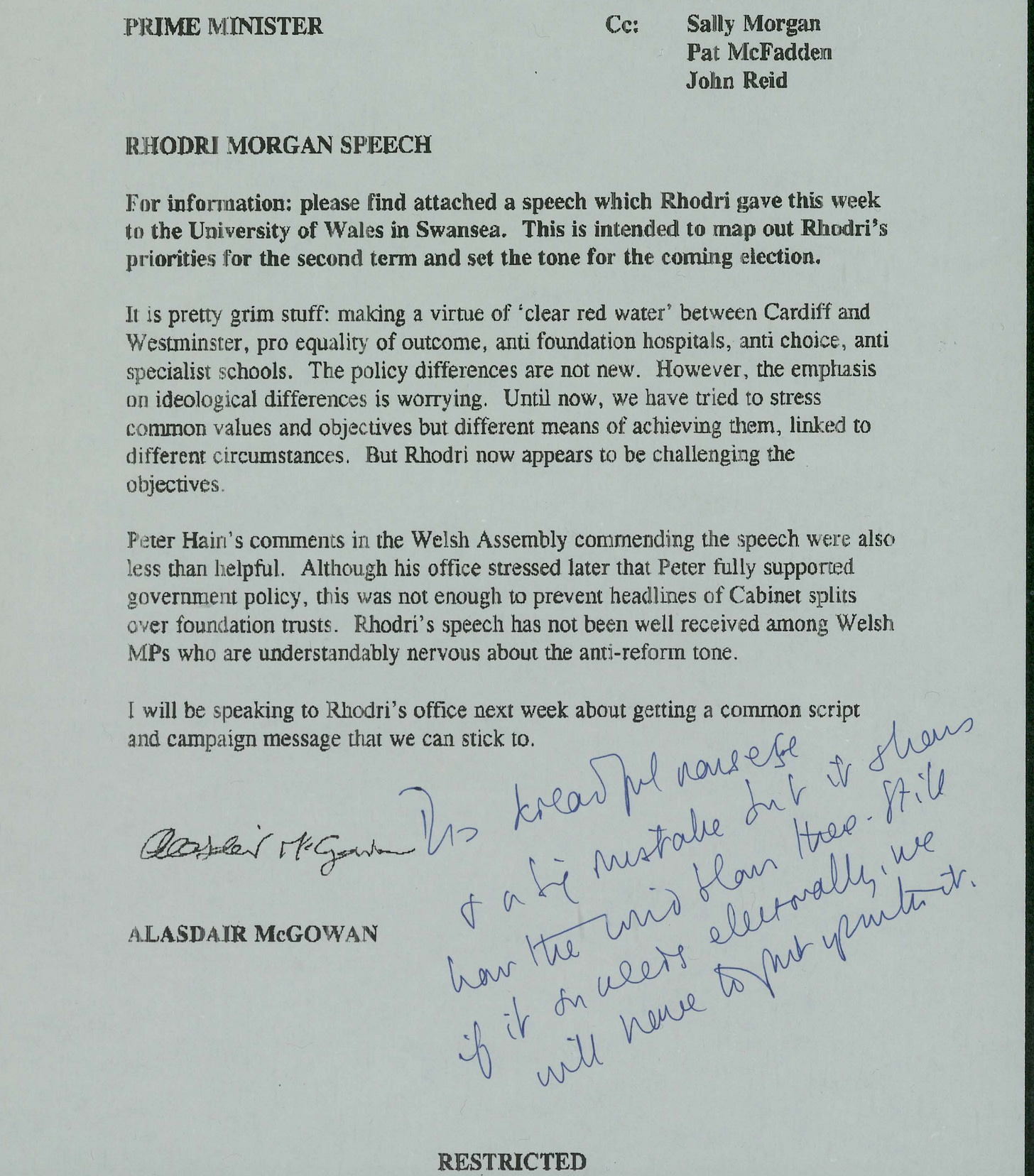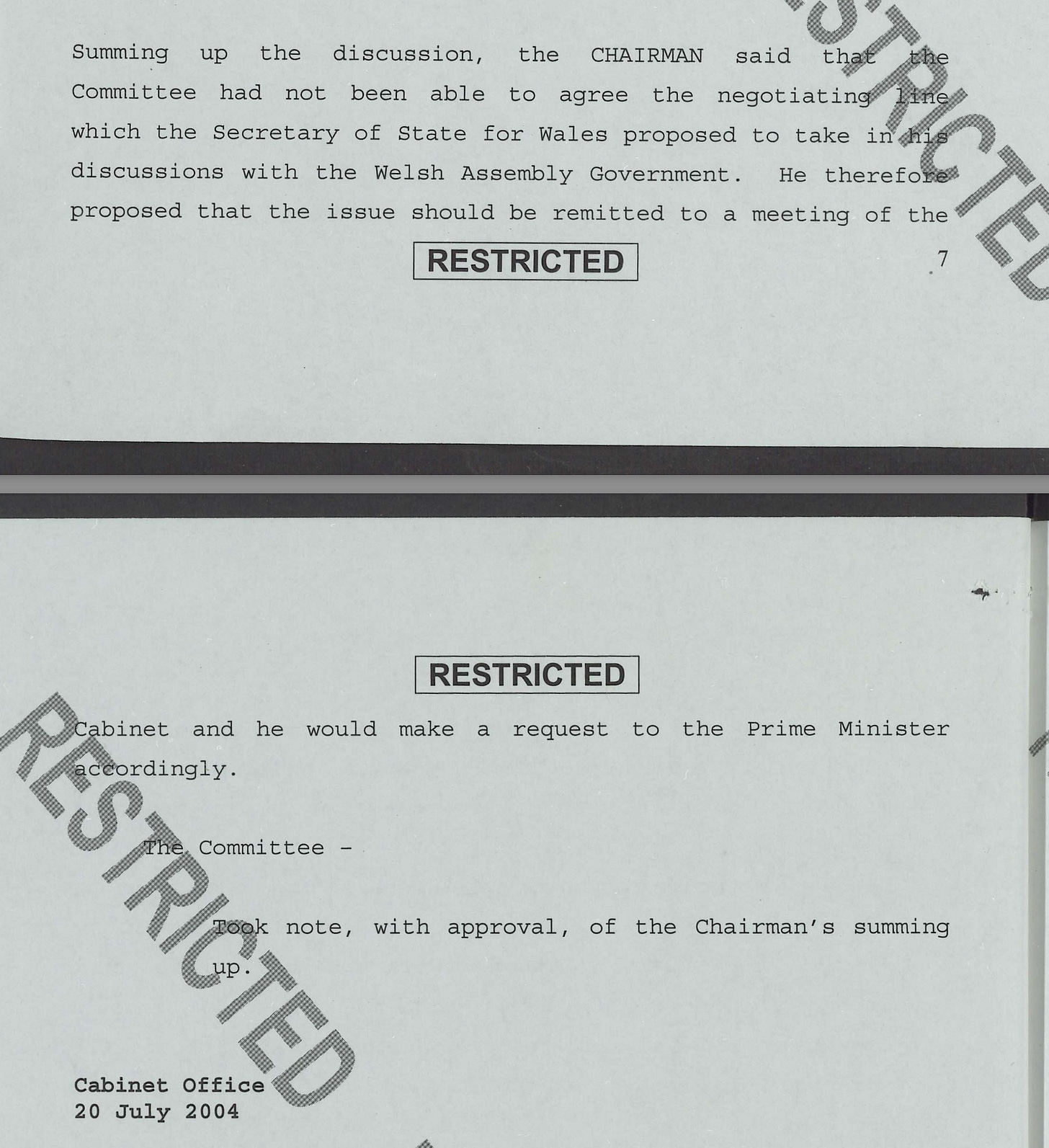The latest National Archive file release
The UK and Welsh Governments from 2002-4
The release of UK Cabinet records under the twenty year rule means Christmas comes twice for history nerds. In late December, records from the Prime Minister’s Office and the Cabinet Office were released. Some of these cover relations between the Welsh Government and the UK Government between 2002 and 2004. They go up to the end of 2004, the year of the Richard Commission report, which I wrote about here, but they also cover isssues such as the devolution of tuition fees, which I mentioned in my post on the Welsh Government Cabinet in 2004 - a decision which didn’t have 100% support in the National Assembly Labour Group. They also cover Tony Blair’s reaction to Rhodri Morgan’s Clear Red Water speech, from December 2002, which he described in a scribble on a memo from a civil servant as ‘dreadful nonsense’.
The recent release of course describes a wide range of other issues, including foreign affairs issues such as the post-invasion state of Iraq, the BBC Charter Review, and my old boss John Birt’s advice to Tony Blair’s Chief of Staff Jonathan Powell on the appointment of a new BBC Chair, to Delivery Unit reports on Crime, Immigration and a range of other issues, new approaches to the NHS (including a long memo from the academic Julian Le Grand on third-term NHS Reform) and on schools which led to the introduction of Foundation Hospitals and Academies. These were things which we didn’t go along with in Wales and indicated a direction of travel rejected by the Clear Red Water speech. The papers also include the note of a conversation between Culture Secretary the late Tessa Jowell and Michael Grade on his possible appointment as BBC Chair in which she says that Grade had told her he had never had any ‘overt’ political affiliation. Which today seems interesting, although to be fair Grade said he had voted Labour in 1997.
The papers also note the concerns expressed by Welsh Labour MPs about the performance of the Welsh Government on issues such as the NHS, and its potential impact on their seats in the next general election, and tensions over all-women shortlists, notably in Blaenau Gwent.
There is a specific memo to the Prime Minister from Professor Julian Le Grand on the NHS in Wales in file PREM49-3661 dated 15 December 2004 which illustrates the challenges that underpinned the concerns of MPs (and indeed Labour Assembly Members). I have made a pdf of this below (note this is Crown Copyright).
Policy discussions on issues such as the proposed White Paper on Public Health to be published by Health Secretary Dr John Reid reveal consideration of the need to share information in advance with the Welsh Government on issues such as smoking legislation which would have a read-across to Wales.
During the 2001 Foot and Mouth crisis animal health secondary legislative powers had not been devolved to Wales and PREM49-3174 contains details of the agreement to transfer these powers to Wales in June 2004. The image is again Crown Copyright.
The Richard Commission obviously is a major item in the development of Welsh devolution and its publication in 2004 was anticipated in a number of internal briefings and inter-departmental letters, documented in PREM49-3796. Peter Hain wrote to his colleagues on 16 January 2004 suggesting it would require ‘careful handling by both the UK Government and the Welsh Government. In his letter Peter suggests that any legislation resulting from the report could not take place before either the UK General Election expected in 2005 or the Assembly election in 2007 (in fact, of course, the Government of Wales Act was agreed in 2006). An extract is below:
Other legislation for Wales is covered in this file, such as the draft Transport (Wales) Bill, and the Public Audit Wales Bill, both of which had scrutiny sessions by committees in the Assembly as well as Westminster (I was a member of the committee on the Public Audit Bill and believe I sat in on at least one of the Transport Bill committee sessions). The regulation of the Public Sector Ombudsman for Wales is also covered, as are severance payments for councillors (a more controversial issue than it sounds), flood prevention, complaints against social landlords and other issues.
The file also includes a briefing for Tony Blair’s visit to Wales in November 2003, inckuding the Welsh Labour Gala Dinner at the Celtic Manor, when he was due to sit at Glenys Kinnock’s table. I remember the event well. The briefing includes lines to take on a variety of Welsh issues, including the NHS, the Richard Commission and all-Women shortlists, specifically mentioning the opposition of the Blaenau Gwent local party. There is a briefing note for a bilateral with Rhodri Morgan on 28 November 2003, which calls the Richard Commission the Richards Commission throughout. This page (again Crown Copyright) is particularly interesting:
The papers also contain a minute of a July 2003 bilateral between the Prime Minister and the First Minister, sent in a letter from the PM’s Office to Lawrence Conway, who headed the First Minister’s Office, as well as a background briefing from Peter Hain for the PM prior to the meeting, and one from the PM’s office. The minute makes clear that Rhodri raised the danger of the ‘Barnett squeeze’, not an unwanted cwtch but a reference to the long-term impact of the formula on the Welsh budget. This is explained in the minute to the PM from his official (again, Crown Copyright):
The PM Office briefing again misnames Richard ‘Richards’.
The folder contains the UK Government’s evidence to Richard, and letters of approval from different departmental ministers, drafted in December 2002. The folder also includes Rhodri’s Clear Red Water speech and the scribbled note from the Prime Minister that it was ‘dreadful nonsense’.
Details of the Wales amendments to the Higher Education Bill, transferring powers to the National Assembly, are set out in Prem49-3454.
This file also has a briefing for the PM for his speech on 2 May 2004 to the annual conference of the National Association of Head Teachers which happened to be in Cardiff that year, together with briefing for local media events prior to the Welsh Council elections in 2004. The briefing mentions that NHS Waiting times in Wales are now falling at record levels. This was the Prime Minister’s first visit to Wales following the Richard Commission report publication. The background briefing set out the following (again Crown Copyright):
The folder also includes a memo to the PM from Andrew Adonis on Academies and Spoecialist schools and the next stage of UK Government schools policy.
Folder PREM49-3417 contains further items relevant to devolution, including in 2002 and 2003 the proposals for the Supreme Court and the creation of the Department of Constitutional Affairs and a series of notes on relations with the devolved administrations and the May 2003 elections, and a Joint Ministerial Committee meeting in 2002.
For me the most interesting file released in the Cabinet Office files, rather than the Prime Minister’s files, was CAB134-6685 which contains the minutes of a meeting of the Ministerial Committee on Devolution Policy to discuss the Richard Commission report in July 2004. The folder also contains the memorandum from Peter Hain on handling the outcome of the Report, making proposals for specific reforms. However, the Committee did not agree the way forward, with concerns expressed that a response would open up the whole issue of devolution again and particularly issues of devolution to the English Regions, and referred the matter to Cabinet as a whole.
The image, again, is Crown Copyright. The folder can be downloaded here. I may write about this in more detail in the future. We obviously have a few accounts by some of the key players at the time in their own memoirs.
Overall, the files released give us added colour on the debates within the UK Government from 2002-4 as they related to Wales, without necessarily adding a great deal to what we already knew. Nevertheless, contemporary commentary is always interesting to read in the light of what we know twenty years later - and sometimes -entertaining.










